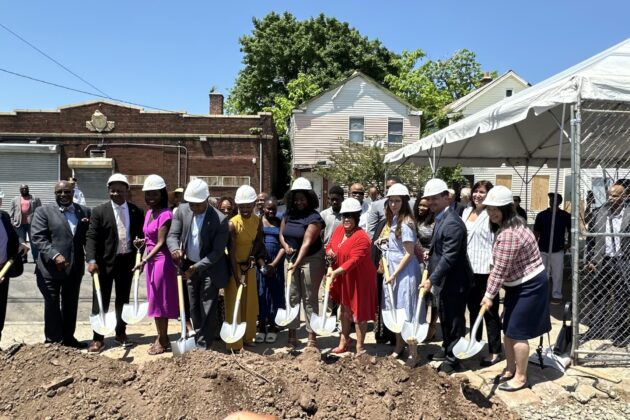
Advancing Housing Justice: Addressing Inequities in New Jersey
Our organization remains steadfast in its vision for a just and equitable New Jersey, where people of all races and communities have opportunities to thrive. Within this framework, we know that we must upend the underlying factors that make New Jersey a state with some of the worst equity indicators in the country. In this piece, we will examine issues related to housing justice and affordable housing initiatives, while also highlighting organizations who dedicate their work to advocating for these issues.
Background
The New Jersey Institute for Social Justice analyzed the 2022 data from the U.S. Census Bureau’s American Community Survey, covering homeownership, median household income, internet access, and more. The findings underscored the racial inequities across the state. In New Jersey, 76.4% of white households own homes, compared to only 39.7% of Black households and 39.6% of Latino households.
The impact of owning a home on a household’s ability to accumulate wealth is significant. The average U.S. homeowner has household wealth of $231,400, while the average renter has household wealth of only $5,200.
Further findings highlight that some areas of the state have particularly high inequities. For example, Passaic County has some of the most severe racial disparities in homeownership in New Jersey. There is a 46.8 percentage point difference in homeownership rates between white and Black residents, and a 43.7 percentage point difference between white and Latino residents. Essex County has the largest racial gap in median household income, with white households comprising
History
These disparities are not surprising given the history of New Jersey’s housing policies. “Redlining,” the government policy that excluded communities of color from homeownership, was part of an extensive, state-sanctioned system of racial discrimination in housing and land ownership that pervaded the state. Today it remains a foundation of New Jersey’s racial wealth gap.
While the federal Fair Housing Act of 1968 explicitly outlawed racially discriminatory practices, economically discriminatory zoning policies remained key barriers to justice. In 1975, the Southern Burlington NAACP brought a case to the New Jersey Supreme Court (Southern Burlington NAACP v. Mount Laurel Township) to fight these discriminatory zoning policies. The NJ Supreme Court sided in favor of the Southern Burlington NAACP to outlaw exclusionary zoning, and the Mount Laurel Doctrine required all New Jersey municipalities to provide their “fair share” of their region’s affordable housing. This landmark civil rights case established one of the strongest frameworks in the country to prevent and address residential segregation.
However, even with the Mount Laurel Doctrine, many cities and towns across New Jersey fail to meet their “fair share” requirements. Continued advocacy and litigation remains essential to hold the gains of this landmark case.
Current Work
In response to these profound housing inequities, the Geraldine R. Dodge Foundation has supported numerous organizations dedicated to combating housing injustice in New Jersey. Partners include Fair Share Housing Center, Housing and Community Network of New Jersey, Inc., Monarch Housing Associates, National Housing Institute, Clinton Hill Community Action, and Urban League of Essex County, among many others.
- Fair Share Housing Center champions housing justice for all through legal strategies, policy reforms, and community-building initiatives across New Jersey. Their efforts enforce the Mount Laurel Doctrine to promote inclusive communities, challenge exclusionary zoning, and oppose barriers to affordable housing development. Advocating for policies like the Fair Chance in Housing Act, the organization aims to protect affordable housing access and address the racial wealth gap by collaborating with stakeholders, government officials, and advocacy groups.
- The Housing and Community Network of New Jersey Inc. works to improve the environment of community development corporations and strengthens their capacity to create housing and revitalize distressed neighborhoods. The network oversees over 250 nonprofit housing and community organizations, professional bodies, and corporations in New Jersey, advocating for housing choices and economic opportunities for low- and moderate-income residents.
- Monarch Housing Associates asserts housing as a fundamental human right, striving to develop affordable and supportive housing and partnering with communities to combat homelessness. They engage people with lived experience navigating unstable housing to help inform their policy advocacy and house the BIPOC Developers’ Collaborative, a statewide network of developers of color addressing housing structural inequities in the state.
- The National Housing Institute, also known as Shelterforce, serves housing justice and community development leaders by delivering insights into housing organizing, community planning, and affordable housing development through its news and content.
- Clinton Hill Community Action collaborates with residents and stakeholders to revitalize the Clinton Hill neighborhood and enhance residents’ quality of life by prioritizing community-driven solutions.
- The Urban League of Essex County is committed to advancing the economic and social status of disadvantaged Essex County residents through programs in education, employment, housing, and economic development.
All of these organizations are doing important work, with different approaches, to achieve the goal of housing equity in our state. Learn more about these organizations, and learn more about housing equity in New Jersey from the NJISJ report.